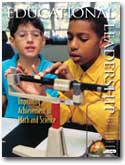September 2004
Teaching for Meaning
Teaching for meaning fosters powerful learning that prepares students for the world beyond school. How can such approaches as authentic learning, project-based learning, and constructivist learning foster deep understanding in students? How can educators apply these strategies across the content areas? How can teachers cover curriculum in both depth and breadth? How can schools resolve the seeming contradiction between teaching for meaning and meeting the demands of standardized testing? How does teaching for meaning lead to higher student achievement? How can meaningful learning contribute to students' engagement in education, good citizenship, and voice in the schools?
Deadline: April 1, 2004
October 2004
Writing!
Reading and arithmetic are high on every school's agenda, but what about their forgotten cousin, writing? Writing enables students to connect their thoughts, deepen their understanding, and communicate with others. Yet because writing resists quantitative assessment and requires a substantial commitment in terms of time, its instruction is often neglected. In recognition of writing's importance, the College Board will require an essay on the SAT starting in 2005. This issue will examine strategies for developing writing skills at all grade levels and in all content areas, explore how to assess writing effectively, and investigate how technology can enhance writing instruction.
Deadline: May 3, 2004
November 2004
Closing Achievement Gaps
The accountability movement has focused renewed attention on longstanding achievement gaps related to ethnicity, socioeconomic status, and gender. This issue will examine the complex factors that cause and perpetuate such gaps. How do researchers define and measure achievement gaps, and what measurements are most valid? How are districts, schools, and teachers successfully closing gaps through such approaches as student engagement, rigorous curriculum, social and emotional support, preschool preparation programs, data analysis, extra help for struggling students, and family involvement? We are looking for descriptions of programs and practices that not only raise test scores but also reach diverse learners and challenge them to excel.
Deadline: June 1, 2004
December 2004/January 2005
Educating Language Learners
This issue will explore two types of language learners: those learning the dominant language of the country in which they live and those learning the dominant language of another country. What are the best ways to learn another language? What skills do students bring from their first language that can help them acquire a new language? How can schools engage parents whose first language is not the country's dominant language? How can teachers integrate students from diverse cultural and linguistic backgrounds into the classroom? We welcome articles on innovative language learning strategies, using subject matter to teach language, and achieving high standards of language acquisition. International contributions are of special interest.
Deadline: July 1, 2004
February 2005
How Schools Improve
What are the crucial ingredients needed to improve a school? How can schools achieve their goals with fewer resources? How do schools set goals? Overcome obstacles to improvement? Analyze data effectively? Recruit and retain highly qualified teachers? Measure and make adequate yearly progress? How can schools align spending with school reform strategies? How can schools create a coordinated and sustained process for improvement? What kinds of leadership facilitate effective change? This issue will explore policies and practices needed to improve schools and will include stories of how schools have gone from being good to great.
Deadline: September 1, 2004
March 2005
Learning from Urban Schools
Urban schools face tough challenges, including low funding levels, poor facilities, large numbers of English language learners, and high student poverty rates. Yet the urgent need for improvement in urban schools has inspired promising innovations. This issue will examine how urban schools are successfully attracting and retaining high-quality teachers and administrators, creating safe environments for learning, and raising standards for students. How are educators in urban schools building strong relationships with parents and partnerships with their community? Ensuring culturally responsive instruction? Providing extra support for students outside of core hours? Making the most of limited funds? Raising test scores without becoming test prep factories?
Deadline: October 1, 2004
April 2005
The Adolescent Learner
Adolescence. It can be a simmering, seething, stormy time. Yet these same conditions can create passionate, engaged students. This issue will examine how schools can tap into the adolescent's potential. What are the classroom ramifications of current research on the emotional, social, cognitive, and moral aspects of this stage of development? How can schools manage the transitions into and out of middle school and high school? What professional development programs enable educators to effectively teach the adolescent learner? How can schools foster student autonomy? How can educators restructure and reinvent middle schools and high schools to meet adolescents' needs?
Deadline: November 1, 2004
May 2005
Supporting New Teachers and Principals
To counteract attrition and cultivate new principals and teachers, schools must replace the trial-by-fire learning approach with a comprehensive network of professional support. This issue will address how schools can provide innovative instructional, emotional, and managerial support to new teachers and principals, from the young and green to seasoned career-changers. What specific ongoing training can ease the transition? How can schools facilitate collegial support? What kinds of teacher induction programs have proven effective? How are schools successfully addressing professional development in the content areas? How can schools provide novices with adequate time for growth? How are schools outside the United States effectively implementing new teacher and principal support programs?
Deadline: December 1, 2004

